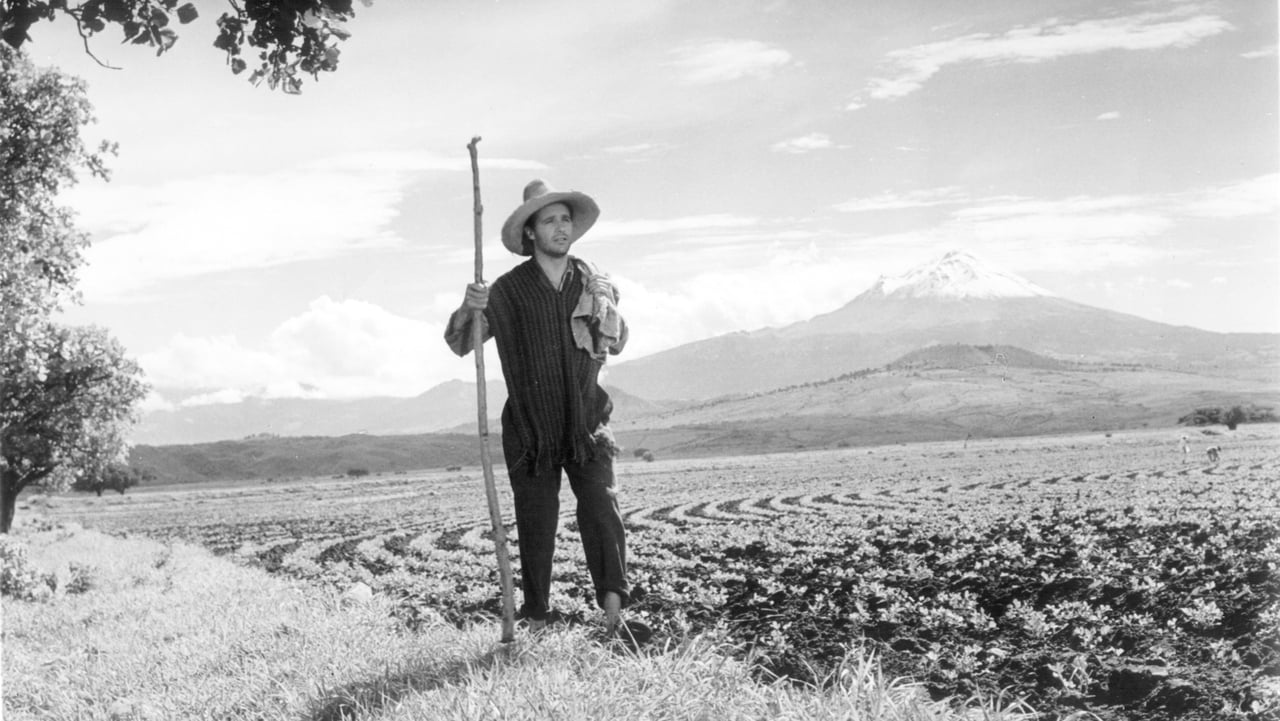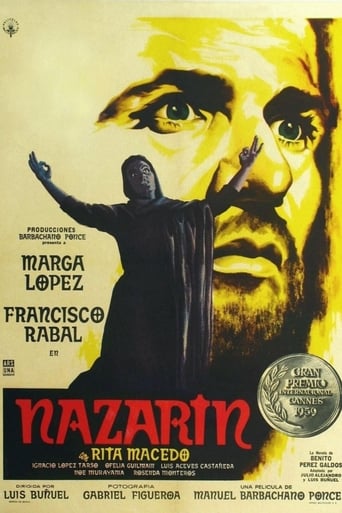

There are women in the film, but none has anything you could call a personality.
... View MoreThe best films of this genre always show a path and provide a takeaway for being a better person.
... View MoreThe storyline feels a little thin and moth-eaten in parts but this sequel is plenty of fun.
... View MoreThis is a dark and sometimes deeply uncomfortable drama
... View MoreA priest (Francisco Rabal) in a poor community lives a charitable life in accordance with his religious principles, but many others do not return the favor.There are two things that really stood out for me with this title. One, if I am not mistaken, Bunuel had a rocky relationship with Catholicism. Yet, here the priest is the hero, and in no facetious or false way. He truly lives a good life, a devout life, and is helpful to his fellow man. He is an inspiration to us all.Second, Francisco Rabal is amazing and really drives this film. He starred in three films directed by Buñuel - "Nazarín", of course, but then later "Viridiana" (1961) and "Belle de jour" (1967). Interestingly, William Friedkin thought of Rabal for the villain of "The French Connection" (1971). However, he could not remember the name of "that Spanish actor". Mistakenly, his staff hired another Spanish actor, Fernando Rey. Friedkin discovered that Rabal did not speak English or French, so he decided to keep Rey. Rabal had previously worked with Rey in "Viridiana". Rabal did, however, work with Friedkin in the much less successful but Academy Award-nominated cult classic "Sorcerer" (1977), a remake of "The Wages of Fear" (1953).
... View MoreI've had a fairly uneasy and bumpy alliance with Luis Buhnel - many rate his work so highly that it is beyond reproach. I think that it can be agreed that whilst often very good, even excellent, his films are not always likable, or easy to watch.So, when this title, second-hand - that I'd not heard of - cropped up at my local Cash Converters, for 99p, I did snap it up, but watching it took some time - and one false start.Infamously anti-catholic, Buhnel again stirs up another hornet's nest, following a Mexican path on a theme that seems familiar with some Italian neo-realist directors; the relationship between the so-visible and commonplace face of "sin" - prostitutes - and the Church. In this case, it's of a rural priest, who like, Claude Raydu in Robert Bresson's 'Diary Of a Country Priest', tries to hold a cynical and generally spiteful local parish together, amongst the poverty and disease - at least spiritually.I know many who cite Bresson's 'Diary Of...' as one of their favourite and most profound films, ever. I admit that, not being of Faith myself, it doesn't resonate personally so highly. Though Nazarin is less about this particular priest's decline in personal health, it suffers the same fate with me. However, it's well made, well acted and I can see why it's a five star film for many.I don't think Buhnel would have been happy if everyone loved all his films - he seems to have been far too antagonistic for that and so my four stars is down more for personal taste than the film itself. The DVD transfer is good and the sound especially clear and well-toned.
... View MoreThe topic of religion in Buñuel films is a point that one, as an eater of films, as an eater of art or as a person need to analyze hardly. One can see to a satirical Buñuel in "La Voie Lactée", "Un Chien Andalou" or in "L'Age d'Or". Is very hard and effective in its critic, but when you have seen this and then you see a movie like "Nazarin", after you see this work you begin to be questioned about its author. And much have questioned about what seems to be a contradiction for Buñuel thinks, but is better not called in this way, i think that there's not any contradiction in its work, only that Buñuel religion point of view is very diverse as unique in films.This beautiful film is based on the novel of Benito Perez Galdós, which told us the story of Father Nazario, who lived a humble, simple life dedicated to God and to help everyone. He lived in a simple and poor region. There lived too Beatriz, who is an abused and abandoned wife. She don't find any sense of her life without her violent, macho man. She have a kind of repulse to him. In the other side is Andara, one of the towns prostitutes. Father Nazario has been stolen again, he blames to Andara's cousin. Andara hear this and try to fight without success with the priest, who don't believe in violence. That night, Andara find that her cousin is actually a thief, she have stole her bellboys. Andara fights with her cousin with terrible consequences. With this, Andara search mercy from the priest. Nazario decides to help her, knowing well that this could be against his church, obviously this thing going to have some consequences. Since here, Nazario going to be a pilgrim. Without nothing, even without shoes, but with spirit and faith. But Andara and Beatriz want to be with he, and be like he, to serve God.If is the sweetest Buñuel film that i have seen so far, is too the most spiritual. Is clear here that the thing that most confuse people with the contradiction is that here, we don't see a Buñuel against the power of church, we see a Buñuel whose film is about church but not in the typical - and great - satirical way. Whethever like it is, i don't think that the right word is contradiction, actually i find it pleasant and well done and in spite of contain such religious issues (As his "Voie Lactée") i found it more a spiritual film but that don't try to touch in diversity the Catholic religion as maybe he touch, and laugh of it in another films. "Nazarin" is of father Nazario and its perspective front God and the same religion but all of this is at the end, analyzed in the spiritual life of this man.The other two women are, not a contrast, but as very well another two perspectives of faith. First we have Beatriz, the mistreated woman, that lose all the faith in life, first with her husband and then with a little girl who was in her family. This little girl was very sick. At side of her was too Andara, the prostitute who run of the justice. In the family of the child, just religious women, there a big pain, but faith becomes in father Nazario when he arrives with nothing to this town. He bless the child, a say later she is fine. The priest want go on walking, but Beatriz and Andara have recovered the faith in life and want to dedicate their lives to God with father Nazario. After some complains, father Nazario decide to be with them, discovering with some things until the end how he feels about faith, God, religion and the person in necessity, the people who must request to charity to survive. This last issue then must be noted as one possible explanation for the pineapple ending. This ending we listen the drums (Similar to that in "L'Age d'Or) and a father Nazario, walking over asking about this things, when he refuse the fruit at the first time and at the end decide to receive it as a symbol of necessity or maybe, as an answer for its spiritual road that begin being priest. Meanwhile, the two women must take away of the father, Andara for its crime (Beautiful scene where she thanks a man who helps father Nazario in jail and then she damn the man who hit the priest in jail) and Beatriz because she prefer be with her macho man, in spite that he treat her bad, just because she don't accept that she fall in loved with the priest. Father Nazario - and here is maybe the unique place in film to critic church- walk to contradict the church, the religion that he serves.Father Nazario is that then, is a (Soft for much, but not for me) critic for some thing in religion (Father Nazario helping a women who is guilty of a crime, of a sin) but most of all is one of Buñuel analysis of faith and life, and he really got it, with a beautiful, tender, sweet and unforgettable film, that is, without a doubt, one of his best.*Sorry for the mistakes...well, if there any.
... View MoreMy third Buñuel movie so far, far much easier to understand than the French productions "Le Charme discret de la bourgeoisie" or "Belle de jour" where imagination and reality intercept each other in higher intervals ah, my neurons keep dancing in whirpool while watching them, taxing anyway.After seeing it, the very first question burst out from my mouth was: International Catholic Cinema Office Award? It's a satire laughing at the ineffectiveness and cowardice of the Church and its discrimination and hostility towards women's validity and value to the Church (or God's Kingdom)! Father Nazario doesn't exist in our days on Earth... Why? Because he is Jesus. Jesus is now in heaven. No worker of God, in flesh and blood would or to be more exactly is able to behave, believe, think, act and live like he does. HOLY Nazario is a huge contrast to the hypocrisy of the Church (represented by his superior) who only focus onto the status and the trouble-free life.I like this movie, especially the very last scene. A village woman gives Father Nazario a fruit, encouraging him to go on. It's a confirmation from the mouth of simple and plain people to what he is doing regardless the hierarchy or the "canonized" or "orthodox" establishment, the Church... touching.
... View More